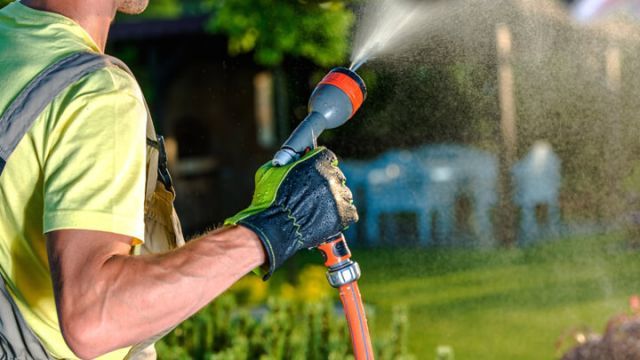
Greywater is water that has been washed down the drain after you shower, used to wash your clothes, or from any other way you use water in your home that doesn’t involve fecal contamination. While it requires that you own your home and aren’t afraid to tinker around with your home plumbing, using a greywater recycling system is a great way to reduce your water consumption and live more sustainably. Setting it up is also not nearly as intimidating as it might sound to those who aren’t handy with tools.
Normally, in homes where there is no greywater recycling, non-toilet based water is mixed in with water from toilets that contain fecal contamination before it is sent to a sewage treatment facility. The greywater (non-toilet based) is then mixed with blackwater (toilet based), even though the greywater contains much less contaminating substances than the blackwater. A recycling system will then run the greywater through a filtration system that is located in your home and then send that water back to be used in toilets or for watering plants, a garden or any non-potable use you may have for water in your home.
Through this method,instead of wasting the resources and additional water to treat greywater in the same sewage treatment facility as blackwater, greywater isn’t sent to a sewage treatment plant until you’ve used it twice and has been thoroughly contaminated enough that it requires treatment before being used for anything else.
While recycled greywater can also be used on your garden and lawn, care must be taken to ensure your greywater isn’t being contaminated by your cleaning or personal care products that you use when you wash your hands, clothes or through showering. Many of the toxic substances that are hiding in our soaps and bath gels are not going to help the plants in your garden grow.
Here are 7 benefits of having a greywater recycling system set up in your home:
1. Reduction in water use by 30 to 50 percent
Depending on how much water you use, and how often you use it, using a greywater recycling system in your home could cut your water use in half. With water being the most important resource for us to conserve on the planet, recycling greywater is an excellent way for anyone looking to reduce their footprint.
2. Saving money
If you are on a water meter, your reduction in water use also means that your water bill will be cut in half as well. However, purchasing and installing a greywater recycling system does require an initial investment either in money or time. If you are handy and require only the materials, you can probably install a system for around $100. Purchasing a basic system and having it installed can run around $4,000 and a high as $20,000 for a large, high-end system.
The filtration system needs to be serviced annually. After all is said and done, however, experts currently estimate that a homeowner would break even at three to seven years after having a system professionally installed. With advances in technology, that time could soon be down to under a year.
3. Heat recovery
Hot water contains thermal energy and we lose that energy down the drain every time we shower, bathe or use hot water in other ways in our home. A greywater recycling system can use some of this thermal energy to heat new incoming cold water, decreasing the amount of energy needed to do so by up to 60 percent.
4. Less water sent to sewage facilities
Depending on where you live, recycling your greywater might help prevent sewage entering waterways untreated. Some cities, such as Baltimore, Maryland, are struggling to meet their sewage system demands. The result is that untreated wastewater ends up in places nobody wants it — like people’s basements in the case of Baltimore wastewater.
5. More conscientious water use
Using a greywater system requires a few changes in how you use your water, and those changes can have an overall benefit to both you and the environment.
For instance, if you are using recycled greywater to water your lawn, you will want to stay away from cleaning products or soaps that contain unwanted chemicals that could both decrease the health of your garden and/or cause salt build up in your filtration system which would require maintenance. Instead typical greywater recyclers use non-toxic soaps and cleaning products, which also leads to a decrease of toxic substances entering sewage treatment facilities.
6. Reclamation of nutrients
Using recycled greywater on your lawn or garden instead of incoming fresh water will help food and non-food bearing plants grow healthier. This is because recycled greywater contains nutrients such as phosphorous and nitrogen that your plants can use to grow — those would otherwise be washed down the drain.
7. Soon it could increase the value of your home
At the moment, such systems may actually be a hindrance to selling your home since many potential buyers would be unfamiliar with the process of watering tomatoes with your bath water (and possibly grossed out at the thought). But, given some time, that could all change. As measures to improve water conservation improve, a home that is fitted in a way to reduce water consumption in half will eventually become an attractive option for people looking to buy homes in water-conserving areas.
Setting up a greywater recycling system may seem like an overwhelming project, but one that has the potential to both help you live more sustainably and save money in the process. Greywater systems can be purchased directly from manufacturers such as Aqua2use, Rain Harvest and Grey Water Recycling.
— Ian Carey

